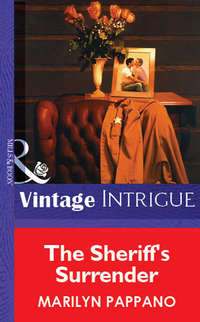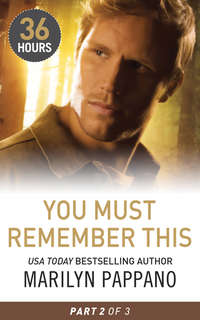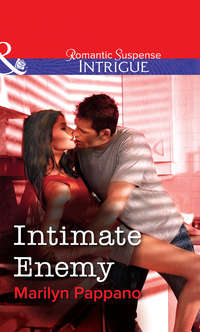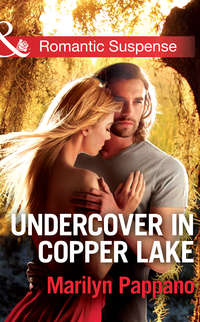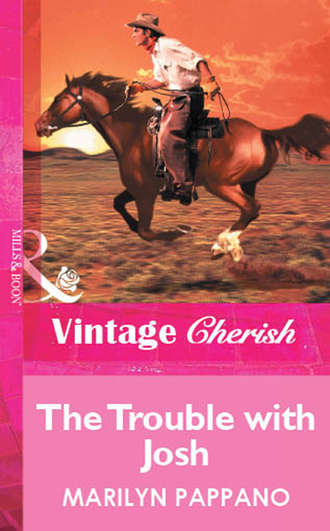
Полная версия
The Trouble with Josh
Cutting through the dining room, he dried his hands, then tossed the towel over one shoulder as he reached the door. The bell rang again an instant before he pulled it open. “Well, well.”
Standing there was the pretty blonde, looking uneasy and edgy. Out of the car, he could see that she was a half foot shorter than him, slender, with hints of curves in the right places. The ball cap was gone, revealing her very short hair, shorter even than his own. She wore linen trousers that were pressed and creased, a long-sleeved white shirt, open at the neck and sleeves rolled halfway to her elbows, and shoes that gave her a few inches of extra height—probably a casual look where she came from, but not in Hickory Bluff.
When she didn’t speak but continued to give him a look that was at the same time blank and startled, he leaned one shoulder against the doorjamb. “Let me guess. You were so dazzled by my charm and boyish good looks that you came back for more.”
“I…I— You—” She drew a deep breath. “I’m looking for Natalie Rawlins. Is she here?”
“Yes, she is, but trust me, darlin’, I’m more your type.” With a grin, he leaned back and called over his shoulder, “Yo, Nat, it’s for you.”
“Who is it?” Natalie called back, and he looked questioningly at the blonde.
Her mouth worked a time or two without producing a sound, then she took another of those deep breaths. “Tell her….” Pitching her voice loud enough to carry, she said, “It’s me, Natalie…Candace.”
The sound of shattering glass echoed through the house, making Candace flinch inside and out. That was not a good sign. In fact, that was a get-in-the-car-and-get-the-hell-out-of-town sign, or the next breakable might be aimed at her. She wanted nothing more than to run away, wanted it with an intensity that surprised her, but her feet wouldn’t move. She couldn’t do anything but stand there and indulge in a mild panic.
Was the flirtatious cowboy the Rawlins from whom Natalie had gotten her new name? Had Candace been thinking mildly lustful thoughts about her former friend’s husband, for heaven’s sake? And what kind of idiot was she, to think that Natalie might ever offer the remotest hint of forgiveness?
The cowboy was looking from her to the back of the house, and the grin was gone. No doubt she’d heard her last friendly word from him. Once he realized who she was, she’d be lucky if he didn’t run her out of town on a rail, or tar and feather her, or whatever they did to unwelcome varmints in these parts.
As footsteps slowly approached the door, she caught her breath. This was it. The moment she’d been anticipating, dreading, visualizing. She’d imagined it a thousand times, with every outcome possible. Nine hundred ninety-nine of them had ended badly.
Finally her feet obeyed, took a step away from the door and toward the driveway, but it was too late. The woman she’d adored, loved, envied, idolized and destroyed appeared in the doorway next to the cowboy, and she was looking at Candace with quiet loathing.
She hadn’t changed much in the five-plus years since Candace had last seen her. Her hair was still long, curling wildly, still the color of new copper, and her skin was still pale and creamy smooth. The clothes were different—faded jeans, scuffed cowboy boots, a chambray shirt—but she was still elegant. Still beautiful. And she still hated Candace.
“What do you want?”
Candace had imagined the question a hundred times and formulated as many answers. She’d been ready. But the instant Natalie had spoken, all the eloquent answers flew right out of Candace’s head. All she could do was stammer and sputter. “I…I want— I’d like—” She breathed, then exhaled the words in a rush. “Can we talk?”
“No.” Reaching past the cowboy, Natalie gripped the door and started to swing it shut.
“Please, Natalie—”
“You couldn’t possibly say anything that would interest me. Get the hell off our property and don’t—”
“Mama said a bad word!”
Candace’s gaze slid past Natalie. The other cowboy, the one who’d worked alongside the dog while the flirt flirted, came to join them, carrying a small child. Though the boy’s hair was auburn, there was no denying the resemblance between him and the man, which suggested he was Natalie’s cowboy, which meant the other wasn’t. It was a selfish thing to consider at the moment, but Candace couldn’t help it. She was relieved.
The second man slid his free arm around Natalie’s waist and hugged her close. “What’s going on, babe?”
Pale and steely-eyed, Natalie replied, “Nothing. She was just leaving.”
Candace cleared her throat. “Natalie, please… I don’t blame you for not wanting to talk to me, but please, just listen to what I came to say.”
“Listen to you lie, twist the facts and manipulate the details? I don’t think so.”
She started to close the door again, and Candace blurted out, “I just wanted to tell you how sorry I am—”
The door closed with a quiet click.
Candace stood there a long time, staring at the door. She wanted to ring the bell again and apologize for disturbing them. She wanted to climb in her car and drive as far away and as fast as she could. She wanted to beg for just a moment of Natalie’s time.
When her lungs began to burn, she finally remembered to breathe, a quick soft gasp that sounded unnervingly close to a sob. Of course it wasn’t. Candace Thompson was tough, ambitious, self-centered. She didn’t cry. She made other people do it. She had cried only twice that she could recall in the past thirty years, the first when she’d thought she was going to die the way she’d lived—alone and unloved—the second, soon after. She hadn’t been able to name a single soul who would mourn her passing, and that had sent her into mourning.
Once she forced her feet to move, she hurried down the steps, then covered the ground to the car in a dozen long strides. She didn’t glance at the house as she backed around an ancient oak, then headed down the driveway. She didn’t wonder if they watched through the blinds with relief that she was leaving.
By the time she’d reached the intersection with the first paved highway, her breathing was relatively normal. She forced her jaw to relax, then eased her two-fisted grip on the steering wheel. She’d tried and failed. End of story, right? So she could mark that goal off her list and go on to the dozens of goals that remained. Right?
Right.
With an overwhelming relief rushing over her, she checked for traffic, then pulled onto the highway. She didn’t intend to waste any time. She would contact the accommodating rental car guy and make arrangements to turn in the car this afternoon, get the RV ready and hit the road first thing in the morning. She had places to go and things to do. She had a life to live. She’d wasted most of the thirty-eight years she’d been given, but she intended to make the next thirty-eight—or however many she had left—worthwhile.
The two-lane highway led her east into Hickory Bluff. The smallest place she’d ever lived had more than 175,000 residents. She wasn’t sure if Hickory Bluff appealed to her in spite of that, or because of it. According to the sign on the edge of town, it was home to 990 two-legged residents, and probably twenty times that of the big, shaggy four-legged variety.
Nothing about the place was fancy. The buildings downtown were built mostly of native stone, and the houses on the blocks extending out from downtown were plain and functional. Most had porches, even the trailers, which weren’t gathered in a mobile home park as she’d come to expect, but were mixed in with the more permanent structures.
High school athletics seemed to be an important part of the community. The water tower was painted green and gold, with the legend Go, Wildcats! Store windows bore hand-painted cheers, pennants or bumper stickers, and a disproportionate number of the people she’d seen wore green ball caps with the Hickory Bluff High School initials embroidered in gold.
It was a rather shabby, worn, homey town, and if she were staying, she would probably be tempted to write an article about just how homey. If she were still writing.
Once she turned onto the main street, she intended to drive straight through town and to the campground. Instead, she found herself pulling into a parking space in front of Merrill’s, a store that could provide you with a driver’s license to drive to the lake, a fishing license to use while you were there, beer and sandwiches for a late lunch and ice to keep them cold. Through the window she could also see a selection of fussily hand-painted T-shirts, a display of plastic Halloween lawn ornaments and stacked-up cases of motor oil, supporting videotapes for rent. At first glance, it seemed an odd combination of goods and services, but she could remember a time when it would have met every one of her father’s needs, especially the beer.
It was hunger that had made her stop—she’d been too nervous to eat breakfast that morning—along with the desire to avoid one more solitary meal. She’d had enough of those in the past eleven months to last a lifetime.
Norma Sue’s Café was in the middle of the block and was one of only three places to eat in town. The others were the Dairy Delight, great for burgers, according to the obviously some-sort-of-relative-to-Natalie’s-husband charmer, and Pepe Chen’s Mexican and Chinese Buffet, an experience she thought she might be better off skipping.
A cowbell jangled over the café door when she went inside. A few people glanced up, and the waitress behind the counter called, “Have a seat wherever,” but that was the extent of attention. She’d expected a few more curious glances but was grateful to be wrong. She wanted to be with other people, but she didn’t necessarily want their attention. Just seeing other faces, hearing other voices, would be enough.
She’d barely settled in an empty booth when the waitress brought her iced water and a menu. She ordered a chicken salad sandwich and pop, then eyed the mile-high meringues on the pies that filled a display cabinet on the counter. She could turn down candy, ice cream and cake, but a good pie would undermine her best intentions every time. Natalie had once suggested that it was because she associated pies with easier, more innocent times—growing up, holidays, family closeness.
Candace hadn’t told her there’d been nothing easy or innocent about her childhood. There had certainly been no family closeness.
Thinking of Natalie stirred an ache in her chest. She’d known all along what the outcome of this trip would be—had known the odds against her succeeding were overwhelming. Still, someplace deep inside, she’d hoped….
If she left Hickory Bluff tomorrow, there could be no more hope.
Listlessly she pulled the legal pad from her bag. It was wrinkled, torn and stained, but the writing was still legible. To be on the safe side, she’d copied its contents into her journal, but there was something satisfying about this original with its stains, tears and doodles. That neatly written list on heavyweight pristine journal paper could well be nothing more than a someday dream, while this one was being made real, slowly but surely.
But not by giving up after one lousy failure.
She was staring at that failure—Make amends with Natalie—when a shadow fell across the paper. Expecting the waitress, she looked up with a faint smile. Seeing the handsome cowboy, she let it fade.
Without waiting for an invitation, he sat down across from her and leaned forward. “I don’t know what the hell you think you’re doing, but you’re not welcome here,” he said in a low, cold voice. It was an amazing change—from the appreciative looks, the lazy drawl and the easy charm to this cold, hard hostility. And he didn’t even know her. Just think how much he could hate her if he did.
“What I’m doing is none of your business,” she said, making an enormous effort to keep her voice as well as her hands steady as she turned the legal pad facedown.
“The hell it isn’t! No one comes around here making trouble for my family without making it my business.”
“I’m not making trouble.”
“Natalie says you are. She says you’re a liar, that you’d backstab your own mother to get ahead. She says you’re dishonest, unethical and untrustworthy and that she wishes she’d never met you.”
Candace stared hard at the tabletop to stop the moisture trying to well in her eyes. No surprises there. She’d known of all the challenges and goals she’d set for herself, this would be the most impossible. Natalie wasn’t inclined to feel an ounce of forgiveness, and understandably so. If Candace were in her place, she wouldn’t feel very forgiving, either. But if she could just find it in her heart to listen—not forgive, not forget, just listen….
“Do us all a favor and get the hell out of town. If you set foot on the ranch again, we’ll have you arrested, and if you go near Natalie again, I swear to God, I’ll make you damn sorry.” He delivered his warning in a voice so fierce, with such force behind it, that she had little doubt he meant every word of it. Then he slid to his feet, almost bumping into the waitress.
“Hey, Josh, can I get you—” The waitress broke off, perplexed, to watch him walk away, then slowly shifted her suspicious gaze to Candace. Making no effort to be friendly, the woman set the dishes down with a thud, sloshing pop onto the cardboard back of the legal pad, then walked away.
So was that the kind of influence the Rawlins family held in Hickory Bluff? Candace wondered wearily as she stared at a chicken salad sandwich big enough for three. Their enemies were the town’s enemies? Was the waitress’s loyalty to Josh in particular, or was the entire town likely to turn against Candace if she stayed?
She was feeling perverse enough to find out.
Chapter Two
Supper at the Rawlinses’ house that evening was an unusually somber affair. Natalie was withdrawn, Tate concerned about her, and Josh…. Truth was, Josh was pretty much in the dark. He didn’t know exactly who Candace Thompson was—someone Natalie had once been friends with, whom she now despised, whose name couldn’t even be mentioned at the table without stony silences or, worse, an awful hurt look sliding over Natalie’s features.
But, bottom line, Josh didn’t need to know any details. Rawlinses stuck together. It was how they got through the bad times, and it made the good times that much better. He didn’t need to know what Candace had done. Natalie was family, and her enemy was the family’s enemy.
Too bad her enemy was so damn pretty.
He finished the supper dishes he’d volunteered to wash and dried his hands, then went into the living room. Tate was sitting on the couch, J.T. snoozing on his lap and Natalie curled up against him. She looked as if she were a thousand miles away, in a place too melancholy to bear.
“I…I guess I’ll head on home,” he said.
“See you in the morning,” Tate responded.
Moving closer, Josh gently ruffled J.T.’s hair, then squeezed Natalie’s hand. She didn’t lift her head from Tate’s shoulder but gave him a sad smile.
The night was chilly, making him glad he’d brought a jacket. The sky was dark and clear, the stars so bright that it seemed he could reach up and touch them. He whistled tunelessly as he crossed to his pickup, then headed home. He lived on the south end of the property, a half mile west of the road in a stand of timber. He and Tate had built the house themselves eight years ago, working in their free time. They’d had precious little of it, so the place was plain and purely functional, which suited him just fine. He didn’t spend much time there, and if he ever married and had kids, he would have to build on. Any prettying-up could be done then.
The road that ran between the two houses was little more than two ruts in the grass. Just before it entered the trees, another narrow lane angled off to the left, giving him quick access to the county road through a rickety gate. The main road went straight, then zigzagged through the trees before finally reaching the clearing where the house stood. It was a simple frame house, painted a dark rusty red. The front porch stood only a foot off the ground, so he hadn’t bothered with railings, and he generally ignored the steps centered in front. He parked at the side, stepped directly up onto the porch, then went in.
The place always seemed so quiet compared to Tate’s house—though this evening next door had been an exception. Of course, having a three-year-old in residence made a hell of a difference. It was nice to walk into Tate’s and hear laughter, chattering and singing, to smell scents like food cooking, perfume and other feminine things, to see childish and womanly touches all over.
Just as it was nice to come in here and find the quiet and privacy he expected.
As he settled on the couch, he listened to the messages on the answering machine. Two were from Theresa, the steadiest of the recent women in his life, one just asking for a call, the other inviting him over later in the week. The third was from the wife of one of his buddies. They were going to a concert in Tulsa on Saturday and would he be interested in going along with her cousin, Stacey.
He grimaced. He’d met Stacey before, and while she was gorgeous, her biological clock was ticking loudly, making her eager to get married. Every time he spent even a few minutes with her, he felt lucky to have escaped unharmed—or unhitched.
It was barely eight o’clock. Too early for bed. He turned on the television and flipped through the channels but found nothing that caught his interest. He considered returning Theresa’s call, but figured she’d be busy grading her fifth-graders’ papers. He ate an apple and tried to finish the thriller that had been sitting on the end table since the last time he’d put it down over two weeks ago. Obviously, it wasn’t thrilling enough.
What he needed was a distraction, and where he usually found his distractions was Frenchy’s, the same place he’d recommended to Candace Thompson for a cold beer. What were the odds she would show up after their conversation at Norma Sue’s? What were the odds she was even still in the county?
And so what if she was and she did go to Frenchy’s? That didn’t mean he had to speak to her or anything. For damn sure he didn’t have to stay home and avoid one of his regular hangouts just because she might be there.
He wasted another ten minutes, trying to talk himself out of it, but when he was done, he grabbed his jacket and Stetson and returned to his truck. When he drove through the gate and onto the county road, he turned left, the shortest route to the bar. He looked for the blonde’s car in the parking lot and was satisfied when he didn’t see it. As tension he hadn’t even been aware of drained from his shoulders, he parked and headed for the door.
Frenchy’s wasn’t much—but then, nothing in Hickory Bluff was. The building was long and squat, built of concrete blocks that had been painted red once upon a time, then white and most recently, gray. Of course, most recently was about ten years ago, so patches of all three colors, as well as bare concrete, showed through.
The floor inside was cement, and the interior surface of the blocks was painted black, as if the windowless building hadn’t already been dark enough inside. Booths lined three walls, and the floor space was shared by tables and chairs, pool tables and a dance floor. A bar ran the length of the back wall, and a bandstand took up one end of the building. Frenchy’s offered live music every other weekend, some of it pretty good. The rest of the time they made do with a juke box, and it was pretty good, too.
Josh knew everyone in the place, and said hello a half dozen times on his way to the bar, where the owner was wiping the counter. He wasn’t French, and his name was Otis. Rumor had it that back in his younger days, he’d met a singer in Paris by the name of Genevieve. They’d fallen in love, and he’d come back here to build this place, where he would tend bar and she would provide the entertainment, but she’d never come to join him and he’d never found out why.
One night, when Otis had been drinking away his profits, he’d confided in Josh that the only Paris he’d ever been to was in Texas and that Genevieve was his shrew of an ex-wife who’d given him good reason to leave that great state.
By the time Josh reached the bar, an icy long-neck was waiting for him. “How’s it going, Otis?”
“Can’t complain. It’s a sad commentary on life in Hickory Bluff that you guys keep me busy. ’Course, what can you expect in a town where the only place to go is away?”
“Aw, it’s not as bad as that. You know, most of us—yourself included—live here because we like it.”
“Because we don’t know no better,” Otis retorted as he moved to wait on a customer at the opposite end of the bar.
Josh turned for a look around the room. Some of his buddies were occupied at the two pool tables at the far end, and a half dozen more sat at the big round table they’d claimed for their own. While he was debating which group to join, his gaze settled on Calvin Bridger, alone in a distant booth. He didn’t ask permission to join Cal, since he’d probably say no and Josh would do it, anyway. He just slid onto the bench across from him.
“I didn’t know you were back in town,” Josh remarked.
Cal took a deep drink from his beer, then scowled at him. “I didn’t ask you to sit down.”
“Good thing I’ve known you all of our worthless lives, or I might think you were being rude. When did you get home?”
“A couple days ago.”
“Where’s Darcy?”
Cal mumbled something and shrugged, then took another long swallow.
The three of them—Josh, Cal and Darcy Hawkins—had gone to school together from kindergarten on. When just about everyone else went out for football, basketball or baseball, Josh and Cal had started rodeoing. Cal had been a lot better at it—had turned it into a career and made a living at it for fifteen years and counting. He’d also married Darcy a few years back, and seemed to be pretty good at that, too.
“You guys staying at your folks’ or hers?” Josh asked.
“Uh-huh.”
“Which one?” It made a difference if a person wanted to go visiting, since the Bridger ranch was a few miles west of the Rawlinses’ and the Hawkins place—called the Mansion with a derisive sniff—was on the east side of Hickory Bluff, high atop a hill and looking down on the town just as the Hawkinses had always looked down on its people.
Cal drained his beer and signaled Otis for another, then fixed a hostile stare on Josh. “I’m staying at the ranch. I don’t have a clue in hell where Darcy is. She didn’t want to go to this last rodeo with me. She didn’t want to come home with me. Here lately she doesn’t want to do much of anything with me. Now will you go the hell away and let me have one beer in peace?”
Josh didn’t argue or press for more details. Taking his beer, he stood up, then turned back. “Let me know before you leave.”
Though it wasn’t a question, Cal nodded. “Yeah, sure.”
Josh never gave a lot of thought to the state of people’s marriages. Some of his buddies changed wives the way other people traded cars. A few had been married a long time and seemed satisfied with their wives, three kids and a dog. Some swore they’d never get married, and he believed them. Some swore the same, and he didn’t. But Cal and Darcy…damn. They’d been together a long time. If asked, Josh would have said they had the second-best chance at staying together forever. First, of course, went to Tate and Natalie.
Looked like he would have been wrong.
He crossed to the round table, into which some joker had carved The Knights, and pulled up a chair, swinging it around backward to straddle. The conversation was football—the college games played the weekend before and the Wildcat game coming up on Friday. Both Tate and Jordan had been Wildcat stars, both scouted by college teams, and Jordan was attending Oklahoma State University on a football scholarship. For those reasons, people seemed to think that made Josh an authority of some sort. Truthfully, he didn’t know any more about the game than anyone else—and didn’t care as much as most of them. Tossing a football around and risking life and limb against guys twice his size didn’t appeal to him at all.


